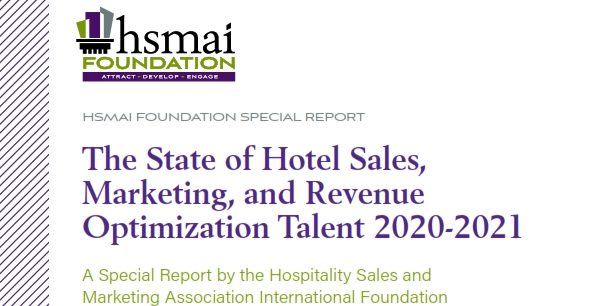By Karen Wollard, Ed. D., CHDM, HSMAI Foundation Research Manager
The hospitality labor shortage is real, and there are few easy answers. Talent was lost in 2020 to furloughs and layoffs, but also to individuals who chose to retire, transition to other industries, or downsize their household income to accommodate diverse needs. Globally, the pandemic has changed visa rules, and immigrant workers who are essential, especially in operations, have not returned. Hotel Management magazine posed this question in late May 2021: How can we market the career potential and the core purpose of the industry to a new base?
 The shock of the coronavirus pandemic has cost the travel industry 8 million jobs. Three million of those are hotel jobs, of which half a million were not expected to return by the start of this year, according to the American Hotel & Lodging Association. The Bureau of Labor Statistics reports a dramatic drop in the accommodation sector in the United States in 2020. Many hotel employees who have weathered 20 years and multiple downturns have questioned whether they should look for a career opportunity in a different industry. “Consider all options because the firm [you worked for] has shown their true opinion of you by furloughing you,” offered one consumer marketing executive with more than 20 years of experience at a major hotel brand. At this point, it is hard to imagine that there is a global labor shortage, but consider this analogy: Weather is not climate.
The shock of the coronavirus pandemic has cost the travel industry 8 million jobs. Three million of those are hotel jobs, of which half a million were not expected to return by the start of this year, according to the American Hotel & Lodging Association. The Bureau of Labor Statistics reports a dramatic drop in the accommodation sector in the United States in 2020. Many hotel employees who have weathered 20 years and multiple downturns have questioned whether they should look for a career opportunity in a different industry. “Consider all options because the firm [you worked for] has shown their true opinion of you by furloughing you,” offered one consumer marketing executive with more than 20 years of experience at a major hotel brand. At this point, it is hard to imagine that there is a global labor shortage, but consider this analogy: Weather is not climate.
Employees who were separated for a year or more sought positions in other industries and chose not to return. The reputation of hospitality and tourism organizations was that they did not support their people in a crisis. This was a major reason 60% of 30,000 job seekers said they would not consider a hospitality job, according to a survey conducted by Joblist.com. Even with incentives such as higher pay, more benefits, signing bonuses and free food, 69% said nothing would change their mind about considering a hospitality job.
Hospitality Schools
Hospitality schools have traditionally been the source of talent for career-oriented interns, management trainees, and first-level supervisors. Declining enrollment in hospitality programs began in 2016, when demographic changes resulted in fewer college-aged students. In 2020, management training programs were abandoned, and new hires were few, so new graduates had to seek other sources of employment. HSMAI Foundation’s academic roundtables found that the top area of concentration in hospitality schools is event planning, followed by operations and then food and beverage management. Marketing, sales, and revenue areas never rank above fourth place.
For sourcing sales, marketing, and revenue management rising stars, the number of skilled graduates isn’t likely to improve, since 49% of hospitality schools still offer no sales classes, and 44% offer no revenue management courses. Most schools offer a general marketing course for hospitality, using a marketing principles concept. This means that hoteliers must either completely train new people for these commercial positions or offer incentives to lure trained talent from other companies.
Faculty told us that most of their students have no exposure to commercial hotel career positions until they take a course in one of the disciplines. Students don’t know how to learn more about these jobs, and hotels rarely expose interns or management trainees to the work in these departments, so there is not a clear career pathway for students to follow. It can be hard for those who have interest to get information or a foot in the door. To make matters worse, the operations departments often have and foster negative opinions about the sales department.
Looking beyond hospitality schools to fill commercial positions is one option many hotels pursue. Business, computer science, accounting, math, and other majors can often be a good fit with appropriate training. Hotels have historically been hesitant to hire people from other industries, preferring to nurture their own talent within the organization, yet necessity is likely to broaden recruitment prospects.
The world is entering a talent migration that’s bigger than anything we’ve seen before, as many employees found their skills were transferable to other industries and that many jobs could be done from anywhere with a reliable internet connection.
The talent shortage is also driving up wages, with new hires being paid, on average, 20% more. Some operations job openings are at the highest levels in history. This is causing HR staffers to commit all their time to recruiting line-level operations people, leaving most commercial executives to source their own talent.
Some hotels have begun applying the sales and marketing strategies usually used to attract guests to the staff recruitment process. Creative advertising design and placement, along with robust sales efforts at job fairs and college recruitment events, are just a few examples of how sales and marketing skills are being applied across new markets.
Commercial executives must help their organizations better sell the dream if they are going to attract and/or retain top talent who will address the challenges of building back business. No longer will the right talent be looking for us. Hotels need to be creating talent workgroups who can ask the tough questions: Do we have clear career paths? Are our salaries competitive? Are we offering the right incentives? Are our supervisors respected, knowledgeable and liked? Are our expectations in line?
This is an excerpt from the HSMAI Foundation’s State of Hotel Sales, Marketing, and Revenue Optimization Talent: 2020-2021 special report. To learn more about the HSMAI Foundation and its mission, visit the Foundation website.
